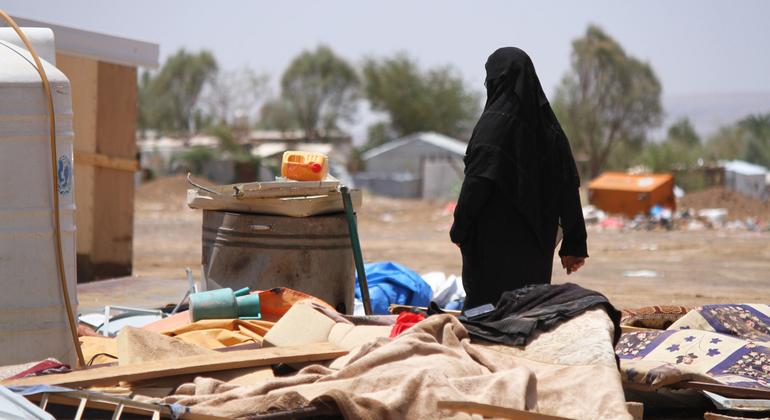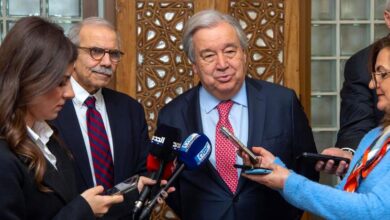Despite regional escalation, peace is still possible in Yemen: UN special envoy


The ongoing crisis comes as Yemeni government forces, backed by the Saudi-led coalition, and Houthi rebels – also known as Ansar Allah – continue their nearly decade-long war.
Mr. Grundberg calling Council “to unite to end the bloodshed and support all efforts to bring peace to a region in dire need of peace.”
Ceasefire and de-escalation
He said the safety of UN staff was also increasingly at risk amid the growing regional escalation, which began last year after the start of the war in Gaza.
Ansar Allah has arbitrarily detained more than 50 UN staff, civil society members and staff of diplomatic missions since June. The 17 UN staff detained include four women, One of them is a member of the special envoy team.
“With all that said, I echo the Secretary-General’s urgent call: An immediate ceasefire and de-escalation in the region are needed to stop this widening conflicthe said.
‘Cycle of retaliation’
Mr. Grundberg told the ambassadors that Yemen and its people were already feeling the impact of the escalating regional conflict.
Ansar Allah has continued to attack international ships in the Red Sea and fire missiles and drones at Israel. In response, the United States, with the support of other countries, launched air strikes on four Yemeni provinces, while Israel conducted air strikes on the important Red Sea port of Huydadah.
“This cycle of retaliation is drawing Yemen deeper into the regional conflict, endangering the country’s hopes for peace and stability,” he said. “Moreover, it distracts from the urgent need to resolve Yemen’s internal crisis.”
Release detainees
After more than nine years of war, he said, the Yemeni people continue to yearn and strive for peace, “yet they see their space for meaningful participation and peacebuilding under attack.” attacks, with arbitrary detention, death threats and intimidation, especially in Ansar Allah.” controlled areas.”
He called on the rebels to immediately and unconditionally release all those arbitrarily detained, including United Nations personnel.
The special envoy added that since the last meeting in September, he has engaged in constructive discussions with Yemeni and international stakeholders during visits to New York, Tehran and Moscow .
Peace is possible
“In addition to asking for support for the release of detainees, my commitments reaffirmed two important messages that I want to share with this Council,” he said.
“First, a peaceful resolution to the conflict in Yemen is not only the most feasible path forward but, more importantly, it is certainly achievable. Second, the Yemeni people need unified and sustained international support, and together we must focus on making peace a reality.”
He pointed to the “elements and tools” already in place, especially the commitments made by the parties towards establishing a roadmap, including a nationwide ceasefire, addressing humanitarian needs and economic as well as preparing for a comprehensive political process.
Make peace a reality
Despite the escalation, he said, they remain “essential building blocks for peace in Yemen and a reference point for our discussions with the parties.”
“Second, on the military front, we are relatively calm on the front lines, although there are occasional flare-ups that remind us of the fragility of the situation,” he continued.
Furthermore, “we have identified options at the technical level and are working to convince the parties that cooperation on economic issues is the only way to achieve economic viability and stability. international”.
Mr. Grundberg said his Office “remains steadfast in pursuing all opportunities for peace in Yemen” but added that parties must demonstrate their commitment to peace through meaningful actions, including the immediate release of all those arbitrarily detained.
“The need for unity of purpose within and beyond Yemen has never been greater. I want to emphasize again that, despite the broader regional conflict, Peace in Yemen is still achievable and we must continue to focus on making this a realityhe said.
The humanitarian situation is dire
Meanwhile, the humanitarian situation in Yemen continues to worsen in both scale and severity, said Joyce Msuya, a senior official with the United Nations aid coordination office. OCHA.
Hunger continued to increase and in August the number of people without enough to eat soared to unprecedented levels. Furthermore, the level of severe food shortages has doubled in Houthi-controlled areas since last year.
Cholera also continues to spread. Since March, there have been more than 203,000 suspected cases and more than 720 deaths. Women and girls account for 53% of cases and aid partners predict cases will double between now and March 2025.
Shortage of aid sources
Msuya said the humanitarian community remained determined to provide large-scale assistance to the 18.2 million Yemenis in need, however, the humanitarian appeal for the country was only more than 40% funded.
“The food security sector quickly needs an additional $870 million. Without this, an estimated 9 million people across Yemen will not receive emergency food aid in the last quarter of 2024,” she warned.
The cholera response is in danger
Furthermore, funding for the cholera response has dried up. Health partners were forced to close 21 of 75 Diarrhea Treatment Centers and 97 of 423 Oral Rehydration Centers.
“It is estimated that 70% of the remaining Diarrhea Treatment Centers and 42% of the remaining Drinking Water Recovery Centers will close by December if emergency funding is not received,” she said.
She added that long-term funding for gender-based violence programs is also important.
Concern for detained staff
The top aid official began his press conference by reiterating his demand for the immediate and unconditional release of currently detained United Nations staff, NGO workers and civil society members. detained by the Houthis, along with two other UN staff who have been detained since 2021 and 2023.
She echoed recent statements released by the principals of the affected institutions, expressing deep concern about the reported move to “criminal prosecution” of a significant number of those affected. detention.
“Making potential ‘charges’ against our colleagues is unacceptable,” she said, while “the arbitrary detention of humanitarian workers and false accusations against They continue to significantly hinder our ability to provide life-saving humanitarian assistance in Yemen.”
Msuya said the United Nations had made ongoing diplomatic efforts with the Houthis and others about the detainees and confirmed that most had been in contact with their families or relatives. Additionally, those who needed health care received it.
“We continue to insist that our colleagues be treated humanely and with full respect for international humanitarian law and human rights, including judicial guarantees, where applicable,” she said.



